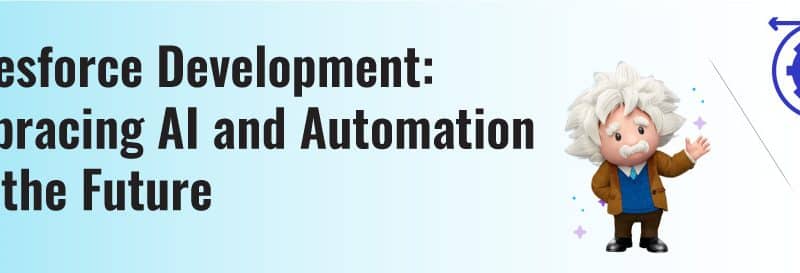Salesforce development is being transformed globally through the integration of AI (Artificial Intelligence) and automation. AI is revolutionising how businesses optimise their customer relationship management and drive growth. From enhancing productivity to personalising customer experiences, AI drives a new generation of innovation and efficiency for Salesforce developers.
This blog will comprehensively analyse how AI and automation are shaping Salesforce development, using detailed examples and statistics from markets in India, the USA, and Australia.
AI and Its Impact on Salesforce Development
AI is transforming industries worldwide, including Salesforce development. In today’s business environment, leveraging AI tools and automation in Salesforce is not just a trend but a necessity. Salesforce development involves customising the platform to meet specific business needs, and AI plays an increasingly significant role in this process.
AI’s Influence on Various Industries
AI impacts various sectors, including e-commerce, healthcare, and finance. In Salesforce development, AI automates many manual tasks, such as data entry, customer segmentation, and predictive analytics. For example, an e-commerce company in India uses AI-powered Salesforce tools to segment customers based on their browsing history, purchase behaviour, and preferences. This approach allows for targeted marketing and enhanced customer experiences.
The financial services sector in the USA is leveraging AI to automate lead scoring within Salesforce, significantly improving conversion rates by focusing on high-potential clients. In Australia, AI is used in the real estate market to automate repetitive tasks like data management, allowing Salesforce developers to focus on higher-value activities such as designing customised dashboards and applications.
Reassurance for Salesforce Developers Amid AI Advancements
While AI can automate repetitive tasks, more is needed to replace the creative problem-solving and strategic thinking that Salesforce developers provide. According to a breakdown by McKinsey, AI can automate about 45% of work activities, but complex decision-making and creative problem-solving remain areas where human developers excel. Salesforce developers should view AI as an enabler that enhances their roles, not a threat.
The Role of Salesforce Developers in the Era of AI
Salesforce developers are at the forefront of integrating AI into business processes. Their role involves designing, building, and customising applications on the Salesforce platform, utilising AI tools to improve customer experience and operational efficiency.
For example, in India’s pharmaceutical industry, Salesforce developers use AI to build applications that help sales teams manage relationships with healthcare providers more effectively. Developers leverage AI-driven insights in the USA’s insurance sector to identify at-risk customers and offer personalised policies. Meanwhile, education sector developers in Australia use AI to create platforms that provide tailored learning experiences based on student data.
The Skills and Expertise of Salesforce Developers
Salesforce developers must possess technical skills, business acumen, and creativity. Essential skills include proficiency in Apex (Salesforce’s programming language), Visualforce (a framework for creating custom user interfaces), and Lightning Components (a UI framework for developing dynamic web applications).
In India, developers working in the retail sector need these skills to create applications that handle high transaction volumes and manage customer data effectively. In the USA, telecom industry developers require data modelling expertise to build scalable solutions for large customer bases. In Australia, Salesforce developers in the travel and tourism industry use their skills to design systems that provide personalised travel recommendations to customers.
Technical Skills and Problem-Solving Abilities
While AI can assist in automating specific tasks, it lacks human intuition and contextual understanding. Salesforce developers use their problem-solving abilities to interpret complex data, design intuitive user interfaces, and develop innovative solutions. For example, a developer in the Australian healthcare sector might use data from wearable devices to create a Salesforce app that helps doctors monitor patient health remotely, combining AI-driven data insights with human expertise.
Why AI Can’t Fully Replace Salesforce Developers
AI excels at handling repetitive tasks but needs to improve in areas that require human judgment, empathy, and adaptability. According to a report by PwC, only 3% of jobs are at high risk of automation by AI, while 30% are at medium risk. This means that the most valuable roles, like those of Salesforce developers, will continue to rely on human expertise.
For instance, in the Indian banking sector, AI can automate data entry and basic customer service inquiries. Still, human developers are needed to design and refine the complex algorithms that power personalised financial advice. Similarly, AI can predict consumer trends in the USA’s retail market, but it cannot replicate the human creativity required to develop innovative marketing strategies based on these insights. In Australia’s education market, AI can help grade assessments, but more is needed to replace the role of Salesforce developers in creating interactive and engaging learning modules.
The Future of Salesforce Development in the Age of AI
The future of Salesforce development is one where AI and automation enhance developer capabilities. AI will handle routine tasks, freeing developers to focus on more strategic and innovative activities. For example, AI-driven tools can automate data cleaning and validation processes in India’s logistics industry, allowing developers to concentrate on building better customer relationship management systems.
Statistics and Examples from Different Markets
- India: In the Indian IT services market, Salesforce developers are expected to reach $19.93 billion by 2025, and they are using AI to build applications that enhance supply chain management and improve client interactions.
- USA: In the USA, the retail industry, valued at $5.6 trillion, is leveraging AI in Salesforce for customer segmentation and personalised marketing.
- Australia: In Australia, the financial sector is investing heavily in AI to automate compliance reporting within Salesforce, which is expected to grow by 13% annually, according to the Australian Financial Review.
How Salesforce Developers Can Adapt and Thrive in the Changing Landscape
Salesforce developers can thrive by continuously updating their skills and embracing AI tools. For example, Indian developers should focus on learning AI-driven tools such as Salesforce Einstein to stay competitive in the fast-growing tech industry. Developers might explore niche markets like fintech or healthcare in the USA, where AI is heavily utilised. Focusing on sectors such as real estate or education, where AI-driven Salesforce applications are gaining traction, can provide new growth opportunities in Australia.
Continuous Skill Development and Learning Platforms
Platforms like Salesforce Trailhead, Udemy, and Coursera offer AI and machine learning courses that help developers stay up-to-date with the latest technologies. Indian developers can benefit from courses on AI integration in Salesforce specific to the retail sector, while USA developers might focus on AI applications in financial services. Australian developers can explore AI’s role in education or real estate.
Case Studies of Successful Salesforce Developers Navigating the AI Revolution
Example 1: Indian Healthcare Sector A Salesforce developer in the Indian healthcare sector used AI to automate appointment scheduling and patient follow-ups. This automation led to a 40% increase in appointment adherence and a 25% improvement in patient satisfaction scores.
Example 2: USA Real Estate Market A developer in the USA real estate market created an AI-powered Salesforce app that analysed property trends and customer preferences. This app, by targeting the most likely buyers, led to a 30% increase in sales and a 15% reduction in marketing costs.
Example 3: Australian E-commerce Industry In Australia, a Salesforce developer used AI tools to segment customers based on buying behaviours and preferences. This segmentation led to a 20% increase in repeat purchases and a 10% increase in overall sales.
Resources and Learning Opportunities for Salesforce Developers
Salesforce developers can leverage various resources to stay updated on AI advancements. Indian developers might find localised AI communities and forums beneficial for networking. Attending AI-focused conferences and webinars in the USA can provide insights into industry trends. Australian developers can join online AI courses tailored to specific markets like real estate or education.
Navigating the AI Landscape: Strategies for Salesforce Developers
To navigate the AI landscape effectively, Salesforce developers should focus on:
- Leveraging AI Tools: For instance, Salesforce Einstein can automate lead scoring and customer segmentation in the financial markets of India, the USA, and Australia.
- Enhancing Data Analysis Skills: Learning to interpret complex datasets and use AI-driven tools to generate actionable insights. This could mean developing apps that analyse patient data for better treatment plans in the USA’s healthcare sector.
- Developing Customer-Centric Solutions: Creating applications that provide personalised experiences, such as AI-driven chatbots for customer service in the Indian e-commerce market or predictive analytics tools for the Australian travel sector.
Realising the Future Potential of Salesforce Developers
The future of Salesforce development is promising. With AI driving innovation, Salesforce developers are uniquely positioned to create advanced solutions that meet the evolving needs of businesses worldwide. By embracing AI, continuously learning, and staying adaptable, developers can ensure they remain essential players in this digital age.
Final Words: The Bright Future of Salesforce Developers in an AI-Powered World
Salesforce developers possess unique skills that make them invaluable in an AI-powered world. While AI and automation significantly change Salesforce development, they also provide opportunities for developers to enhance their capabilities and create innovative solutions. By embracing AI, staying current with technological advancements, and maintaining adaptability, Salesforce developers can look forward to a secure and promising future in the AI era.

 +1 561 220 0044
+1 561 220 0044 +61 255 646464
+61 255 646464 +91 909 080
3080
+91 909 080
3080

